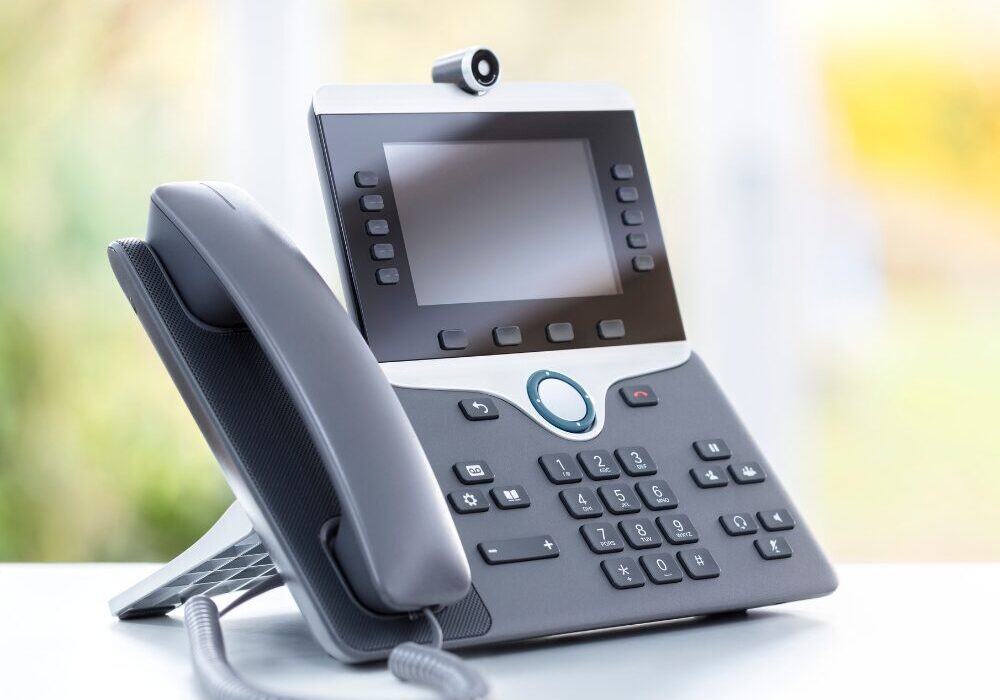
The age-old question that haunts everyone: when to upgrade? That upgrade could be a car, cell phone, computer, or trusty wallet, but more specifically, “When do you upgrade your business phone system?” It’s a great question to ask; frankly, if you’re asking that question, the answer is probably now. A cloud-based VoIP business phone system is more critical for the health of your business than you might realize.
Are you reaching your customers the best way you can? Do you meet their needs, or are you missing something? Read on, and we’ll discuss how you’ll know you need to upgrade to a VoIP phone system.
What is a Cloud-Based VoIP Business Phone System?
A cloud-based VoIP (Voice over Internet Protocol) business phone system can easily be broken down by describing it as having the ability to make and receive calls through an internet connection instead of analog lines. According to G2, your ongoing costs for switching to VoIP could be as much as 50 percent. Additionally, for small businesses, the initial investment is as much as 90 percent less than that of a traditional system.
More importantly, the VoIP phone system is hosted in the cloud, which can be accessed anywhere you or your employees are. Since your VoIP provider manages the system in the cloud, you will always have the latest and greatest features and a clear connection, which is geographically redundant, so you’re safe from natural or unforeseen disasters.
Signs You Need to Upgrade Your Business Phone System
The last five years have given many scenarios that prove a new business phone system is needed. Customer expectations have changed dramatically since the pandemic started, and chances are your current system is no longer cutting it.
A recent report from Salesforce found that 73 percent of customers expect companies to understand their unique needs and expectations. This is not only from customers but also because your business needs the ability to flex and be agile when situations arise.
Can you confidently say that what you have now meets your customers’, employees’, and business needs?
Outdated Technology
If you still rely on analog telephone lines or an on-premise phone system, your days are numbered with access to functioning telephone lines and supported systems.
The FCC has officially deregulated analog lines, meaning the service providers are no longer required to keep the lines up and running. Currently, there’s a California court case with AT&T carrier of last resort (COLR) pending, which could decide the next steps for the entire country.
Until then, getting the ball rolling and securing your VoIP provider will be crucial. At Beardon, we offer various advanced technologies to power your business.
Poor Call Quality and Reliability
Poor voice quality is a thing of the past. With VoIP, prioritization can be given through QoS, or quality of service, so when a call comes through your internet connection, everything becomes secondary to the voice call.
Think of QoS as the traffic lights all turning green when an emergency vehicle approaches; everyone knows to get out of the way and proceed cautiously.
Lack of Advanced Features
There’s a good chance that if you need to upgrade your system, you’re itching for the advanced features you’ve been missing. Although not a complete list, here are some of the highlights of moving to a cloud-based VoIP business phone system:
| HD Voice Quality | Easy to Use App |
| Video Conferencing | Multi-Device Support |
| Voicemail to Email | Virtual Numbers |
| Call Recording | Multiple Physical Locations |
Features aren’t everything, but they can make or break a customer’s experience with your business. By improving the technology behind your business communication, you can exponentially raise the quality of your service by taking full advantage of the features.
Unable to Scale or Offer Flexibility
You need flexibility to scale your business, but your antiquated business phone system can’t do that. Whether you currently offer remote or hybrid work, having a disaster recovery plan that incorporates the remote capabilities of a VoIP phone system will save you in the event of an uncontrollable disaster.
Can you say without hesitation that your business could survive any downtime? According to FEMA, 43 percent of small companies affected by a disaster never reopen after the disaster, and an additional 29 percent go out of business within two years of the disaster.
Any Investment in Your Business Needs to be Carefully Considered; A Cloud-Based VoIP Business Phone System Needs Your Evaluation
The verdict is clear: you get an upgraded system with features you’re currently lacking for most likely drastically cheaper than you’re paying now. Here at Beardon, we stand by these claims. Contact us, and let’s discuss how we can build the best system for your needs.
